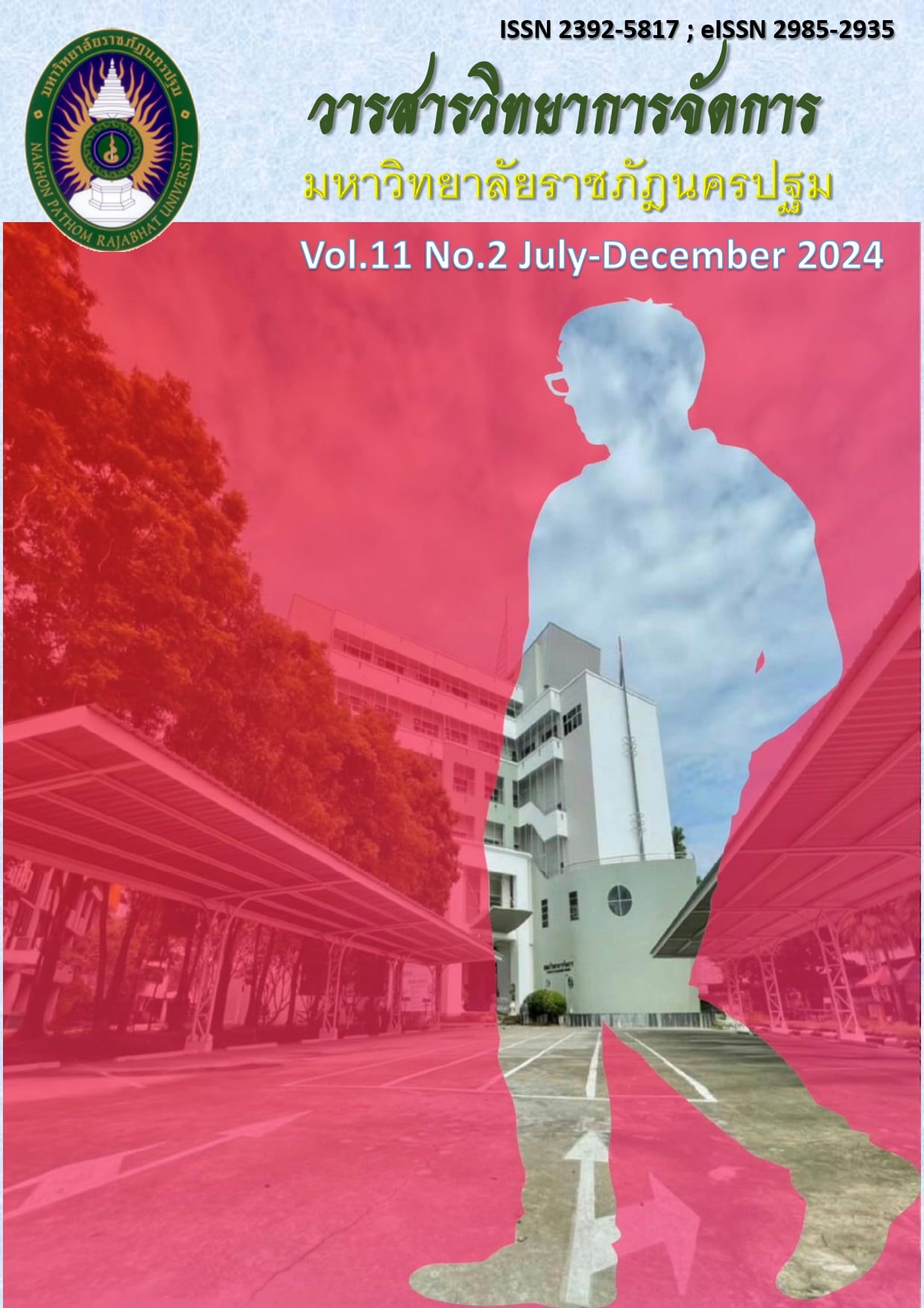การประยุกต์ใช้ปัญญาประดิษฐ์ในการจัดการอีสปอร์ต: โอกาสของไทย
Main Article Content
บทคัดย่อ
อุตสาหกรรมอีสปอร์ตกำลังเติบโตอย่างก้าวกระโดด กลายเป็นปรากฏการณ์ระดับโลกที่มีความสำคัญทั้งในด้านเศรษฐกิจและวัฒนธรรม ในประเทศไทย ระบบนิเวศอีสปอร์ตขยายตัวอย่างรวดเร็วโดยได้รับแรงผลักดันจากการสนับสนุนของรัฐบาล การลงทุนเชิงกลยุทธ์ และความร่วมมือกับบริษัทยักษ์ใหญ่ต่าง ๆ ปัจจัยเหล่านี้ทำให้ประเทศไทยกลายเป็นผู้เล่นสำคัญในภูมิภาคเอเชียตะวันออกเฉียงใต้ สะท้อนถึงศักยภาพด้านนวัตกรรมและความสามารถในการแข่งขัน
ปัญญาประดิษฐ์ (AI) กำลังพลิกโฉมการจัดการอีสปอร์ต ด้วยการเพิ่มประสิทธิภาพการเล่นของผู้เล่น ปรับปรุงการดำเนินงานของการแข่งขัน และยกระดับประสบการณ์ของผู้ชม ในประเทศไทย การนำ AI มาใช้เริ่มมีบทบาทสำคัญในการวิเคราะห์ข้อมูลการเล่น พัฒนากลยุทธ์ และสร้างประสบการณ์ที่ดึงดูดผู้ชม อย่างไรก็ตาม การนำ AI มาประยุกต์กับการจัดการอีสปอร์ตยังมีความท้าทายที่สำคัญ เช่น ความกังวลด้านการคุ้มครองข้อมูลส่วนบุคคล ความเหลื่อมล้ำของโครงสร้างพื้นฐานดิจิทัล และช่องว่างด้านทักษะ ซึ่งต้องได้รับการแก้ไขเพื่อให้การผสานเทคโนโลยี AI เข้ากับระบบนิเวศอีสปอร์ตเป็นไปอย่างมีจริยธรรมและเท่าเทียม
บทความนี้วิเคราะห์การประยุกต์ใช้ AI ความท้าทาย และโอกาสในอนาคตสำหรับการจัดการอีสปอร์ต โดยเน้นบริบทเฉพาะของประเทศไทย พร้อมทั้งชี้ให้เห็นถึงความสำคัญของการสนับสนุนจากภาครัฐ การขยายหลักสูตรการศึกษา และการพัฒนาศูนย์นวัตกรรมอีสปอร์ต แม้การก้าวขึ้นเป็นผู้นำระดับโลกในด้านอีสปอร์ตที่ขับเคลื่อนด้วย AI จะยังเป็นเป้าหมายที่ท้าทาย แต่ความพยายามเหล่านี้สามารถช่วยเสริมความแข็งแกร่งให้กับสถานะของประเทศไทยในภูมิภาคและเวทีโลกได้อย่างมีนัยสำคัญ
1,2คณะวิทยาการจัดการ มหาวิทยาลัยราชภัฏนครปฐม, นครปฐม.
* Corresponding author: assanee@webmail.npru.ac.th
Article Details

อนุญาตภายใต้เงื่อนไข Creative Commons Attribution-NonCommercial-NoDerivatives 4.0 International License.
ทัศนะและข้อคิดเห็นของบทความที่ปรากฏในวารสารฉบับนี้เป็นของผู้เขียนแต่ละท่าน ไม่ถือว่าเป็นทัศนะและความรับผิดชอบของกองบรรณาธิการ
เอกสารอ้างอิง
Acree, J. (2024). Shaping the future of Esports with AI. USC Annenberg School for Communication and Journalism. Retrieved April 29, 2024, from https://annenberg.usc.edu/research/center-public-relations/usc-annenberg-relevance-report/shaping-future-esports-ai
Apriliyanti, I. D., Ekowati, D., and Saraswati, R. (2021). Digital divide in ASEAN member states: Analyzing the critical factors for successful e-government programs. Online Information Review, 45(6), 1104–1125. https://doi.org/10.1108/OIR-05-2020-0158
Davenport, T. H., and Ronanki, R. (2018). Artificial intelligence for the real world. Harvard Business Review, 96(1), 108–116.
Digital Economy Promotion Agency (DEPA). (2023). eSports: เกมที่เป็นมากกว่าเกม [eSports: More than just a game]. Retrieved April 29, 2024 from https://www.depa.or.th/th/article-view/esports [in thai]
Durwin, A. S. (2023). Impact of artificial intelligence (AI) in gaming technology. Journal of Harbin Engineering University, 44(7), 1352–1355.
Esports Insider. (2023). AI in esports. Retrieved November 23, 2023, from https://esportsinsider.com/2023/11/ai-esports
Forbes. (2023). AI-powered audience growth: How esports uses artificial intelligence to connect with fans. Retrieved September 26 from https://www.forbes.com/councils/forbestechcouncil/2023/09/26/ai-powered-audience-growth-how-esports-uses-artificial-intelligence-to-connect-with-fans/
Ghatak, S. (2023). Lessons we learn: AI in eSports—How artificial intelligence is shaping the world of competitive gaming. Retrieved April 6, 2024, from https://www.linkedin.com/pulse/lessons-we-learn-ai-esports-how-artificial-shaping-world-ghatak
Intaratat, K. (2021). Digital skills scenario of the workforce to promote digital economy in Thailand under and post COVID-19 pandemic. International Journal of Research and Innovation in Social Science, 5(10), 116–127. https://doi.org/10.47772/IJRISS.2021.51002
Jordan-Vallverdú, V., Torres-Pruñonosa, J., Plaza-Navas, M.-A., and Raya, J. M. (2024). The intellectual structure of esports research. Entertainment Computing, 49, 100628. https://doi.org/10.1016/j.entcom.2023.100628
Keiper, M. C., Fried, G., Lupinek, J., and Nordstrom, H. (2023). Artificial intelligence in sport management education: Playing the AI game with ChatGPT. Journal of Hospitality, Leisure, Sport and Tourism Education, 33, 100456. https://doi.org/10.1016/j.jhlste.2023.100456
Kittitachs. (2023). Sportlyze: บริษัทวิเคราะห์อีสปอร์ตที่จะพา AI คนไทยไปตลาดโลก. Retrieved , October 6, 2023 from https://www.oneesports.co.th/gaming/sportlyze-บริษัท-วิเคราะห์/[in thai]
Lopez-Sintas, J., Lamberti, G., and Sukphan, J. (2020). The social structuring of the digital gap in a developing country: The impact of computer and internet access opportunities on internet use in Thailand. Technology in Society, 63, 101433.
Mana, K., and Butr-Indr, B. (2022). Appropriate measures of personal data protection in processing by artificial intelligence under Thai law: Study specific on machine learning. [Master’s thesis, Thammasat University]. Thammasat University E-Thesis Archive. https://ethesisarchive.library.tu.ac.th/thesis/2022/TU_2022_5901040187_17613_26816.pdf
Manoharan, A. (2024). Enhancing audience engagement through AI-powered social media automation. World Journal of Advanced Engineering Technology and Sciences, 11(2), 150–157. https://doi.org/10.30574/wjaets.2024.11.2.0084
PDPA Thailand. (2022,). ธุรกิจเกม ต้องระวัง! ละเมิดสิทธิผู้เยาว์ ตามกฎหมาย PDPA [Gaming business must beware! Violating minors’ rights under the PDPA]. Retrieved August 30, 2023, from https://pdpathailand.com/article/article-game-caster-pdpa/[in thai]
Prasad, R. K., and Makesh, D. (2023). Impact of AI on media and entertainment industry. In Media and Journalism Transformations: Emerging Trends and Paradigm Shifts (pp. 41–52).
Ringer, C., Missaoui, S., Hodge, V. J., Chitayat, A. P., Kokkinakis, A., Patra, S., Demediuk, S., Caceres Munoz, A., Olarewaju, O., Ursu, M., Kirman, B., Hook, J., Block, F., Drachen, A., and Walker, J. A. (2023). Time to Die 2: Improved in-game death prediction in Dota 2. Machine Learning with Applications, 12, 100466. https://doi.org/10.1016/j.mlwa.2023.100466
Royal Thai Government Gazette. (2024). ประกาศคณะกรรมการกีฬาอาชีพ เรื่อง กำหนดชนิดกีฬาอาชีพ พ.ศ. 2566 [Announcement of the Professional Sports Committee regarding the designation of professional sports, B.E. 2566]. Retrieved April 6, 2024, from https://ratchakitcha.soc.go.th/documents/18007.pdf [in thai]
Smerdov, A., Belokurov, A., Ivanov, E., and Knyazev, A. (2022). AI-enabled prediction of video game player performance using data from heterogeneous sensors. Multimedia Tools and Applications, 81(10), 13567–13587. https://doi.org/10.1007/s11042-022-13464-0
Soodmee, T., and Jaroenwiriyakul, S. (2021). The future of e-sports: Factors affecting performance in Thailand. In Proceedings of the 14th National and 1st International Conference on Business, Economics, and Sustainable Development. NIC-HUSO 2021). Burapha University, on June 17-18, 2021. pp.1411-1427.
Statista. (2024). Esports - Thailand: Statista market forecast. Retrieved March 3, 2024, from https://www.statista.com/outlook/amo/esports/thailand
Taylor Wessing. (2023). A practical guide on AI ethics and accountability in video games. Retrieved March 3, 2024, from https://www.taylorwessing.com/en/interface/2023/ai-and-video-games/a-practical-guide-on-ai-ethics-and-accountability-in-video-games
Vandeweyer, M., Espinoza, R., Reznikova, L., Lee, M., and OECD. (2020). Thailand's education system and skills imbalances: Assessment and policy recommendations. OECD iLibrary. https://doi.org/10.1787/b79addb6-en
Wang, M. (2023). The communication effectiveness of AI win prediction applied in esports live streaming: A pilot study. In Advances in AI Technologies (pp. 315–325). Springer. https://doi.org/10.1007/978-3-031-49368-3_19
Wongwatkit, C., Thongsibsong, N., Chomngern, T., and Thavorn, S. (2023). The future of connectivist learning with the potential of emerging technologies and AI in Thailand: Trends, applications, and challenges in shaping education. Journal of Learning Science and Education, 2(1), 122–154. [in thai]
Xu, Y. (2023). The evolving eSports landscape: Technology empowerment, intelligent
embodiment, and digital ethics. Sport, Ethics and Philosophy, 17(3), 356–368.


